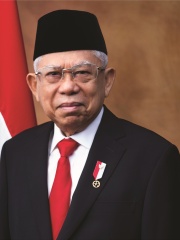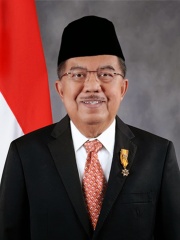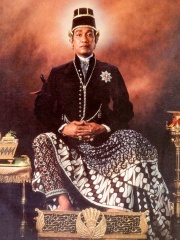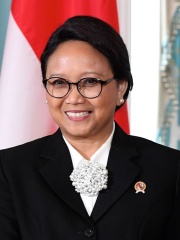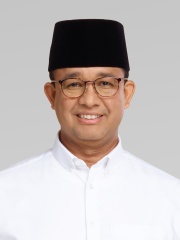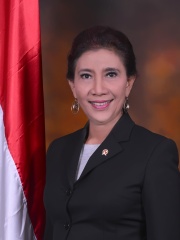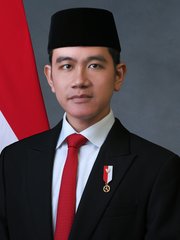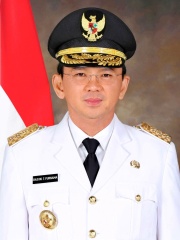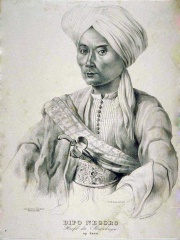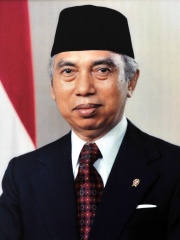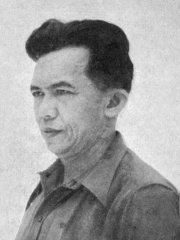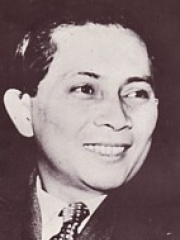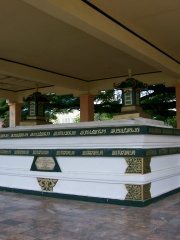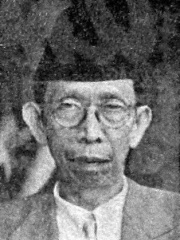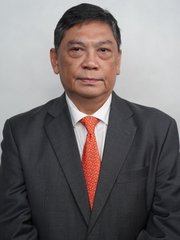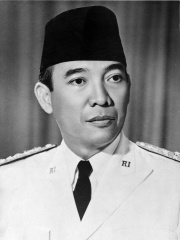
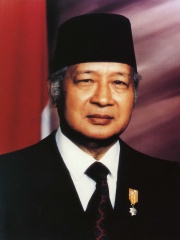
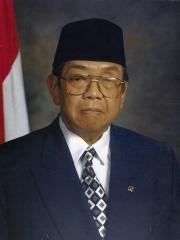
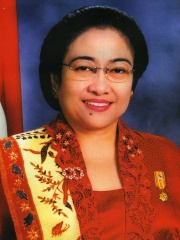
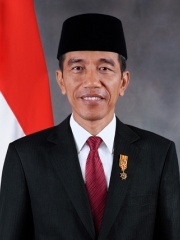
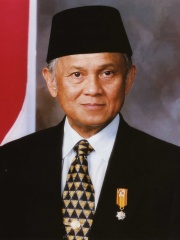
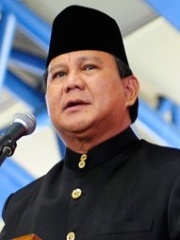
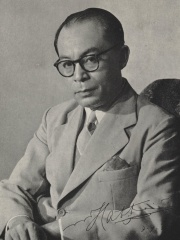
The Most Famous
POLITICIANS from Indonesia
This page contains a list of the greatest Indonesian Politicians. The pantheon dataset contains 19,576 Politicians, 36 of which were born in Indonesia. This makes Indonesia the birth place of the 79th most number of Politicians behind Azerbaijan, and New Zealand.
Top 10
The following people are considered by Pantheon to be the top 10 most legendary Indonesian Politicians of all time. This list of famous Indonesian Politicians is sorted by HPI (Historical Popularity Index), a metric that aggregates information on a biography's online popularity. Visit the rankings page to view the entire list of Indonesian Politicians.

1. Sukarno (1901 - 1970)
With an HPI of 81.02, Sukarno is the most famous Indonesian Politician. His biography has been translated into 108 different languages on wikipedia.
Sukarno (born Koesno Sosrodihardjo; 6 June 1901 – 21 June 1970) was an Indonesian statesman, activist, and revolutionary who served as the first president of Indonesia from 1945 to 1967. Sukarno was the leader of the Indonesian struggle for independence from the Dutch colonialists. He was a prominent leader of Indonesia's nationalist movement during the colonial period and spent over a decade under Dutch detention until released by the invading Japanese forces in World War II. Sukarno and his fellow nationalists collaborated to garner support for the Japanese war effort from the population, in exchange for Japanese aid in spreading nationalist ideas. Upon Japanese surrender, Sukarno and Mohammad Hatta declared Indonesian independence on 17 August 1945, and Sukarno was appointed president. He led the Indonesian resistance to Dutch re-colonisation efforts via diplomatic and military means until the Dutch recognition of Indonesian independence in 1949. As a result, he was given the title "Father of Proclamation" (Indonesian: Bapak Proklamator). After a tumultuous period of parliamentary democracy, Sukarno introduced an authoritarian system known as "Guided Democracy" in 1959 to restore stability and suppress regional rebellions. By the early 1960s, Sukarno pursued an aggressive foreign policy and positioned Indonesia as a leading voice in the anti-imperialist Non-Aligned Movement (NAM). These policies increased tensions with Western powers and brought Indonesia closer to the Soviet Union, despite being a non-communist state. The culmination of this policy was CONEFO, Sukarno's plan for a new United Nations based in Jakarta. Following the events of the 30 September Movement in 1965, which was blamed on the Communist Party of Indonesia (PKI), General Suharto assumed control of the government in a military takeover. This was accompanied by a large-scale anti-communist purge backed by Western intelligence agencies including from the United States and the United Kingdom. Between 500,000 and over one million people were killed in mass killings targeting members and suspected sympathisers of the PKI. Suharto officially became president in 1967, while Sukarno was placed under house arrest until his death in 1970. He was buried in Blitar, East Java, next to his mother. During the first few years of Suharto's New Order regime, Sukarno's role in the country's independence and his earlier achievements were minimized, and his name was largely removed from public discourse. However, as opposition against Suharto increased with his eventual fall in 1998, public interest in Sukarno was revived in tandem to democratic reforms. Today, his legacy as the founding father of Indonesia and a symbol of national unity and independence continues to be widely respected by many Indonesians, often more so than that of Suharto.

2. Suharto (1921 - 2008)
With an HPI of 78.54, Suharto is the 2nd most famous Indonesian Politician. His biography has been translated into 107 different languages.
Suharto (8 June 1921 – 27 January 2008) was an Indonesian military officer and politician who served as the second and longest-serving president of Indonesia from 1967 to 1998. Widely regarded as a military dictator by international observers, Suharto led Indonesia as an authoritarian regime from 1967 until his resignation in 1998 following nationwide unrest. His 31-year dictatorship is considered one of the most brutal and corrupt of the 20th century: he was central to the perpetration of mass killings against alleged communists and subsequent persecution of ethnic Chinese, irreligious people, and trade unionists. Suharto was born in Kemusuk, near the city of Yogyakarta, during the Dutch colonial era. He grew up in humble circumstances. His Javanese Muslim parents divorced not long after his birth, and he lived with foster parents for much of his childhood. During the Japanese occupation, Suharto served in the Japanese-organized Indonesian security forces. During Indonesia's independence struggle, he joined the newly formed Indonesian Army and rose to the rank of major general some time after full Indonesian independence was achieved. An attempted coup on 30 September and 1 October 1965 was countered by Suharto-led troops. The army subsequently led a nationwide violent anti-communist purge. In March 1967, the MPRS appointed Suharto as acting president, and he was appointed president the following year. When Suharto came to power, inflation was running at over 650%. He appointed an economic advisory group that implemented free market policies, and by 1969 the country entered a period of price stability. Suharto ordered an invasion of East Timor in 1975, followed by a 23-year occupation of the country and genocide. Under his "New Order" regime, Suharto established a strong, centralised government dominated by the military, evolving from an initial oligarchic military dictatorship into a deeply authoritarian state centred on a cult of personality that elevated him as the nation's undisputed leader. His staunch anti-communist stance and ability to maintain political stability across Indonesia's vast and diverse archipelago secured significant economic and diplomatic backing from Western powers, particularly the United States, during the Cold War. During much of his presidency, Indonesia underwent rapid industrialisation, sustained economic growth (with GDP growing at around 7% per annum,) improved education, and a rise in domestic entrepreneurship, developments that led the People's Consultative Assembly (MPR) to name him "Father of Development" (Indonesian: Bapak Pembangunan) in 1982. In 1986, he was awarded the Ceres Medal by the United Nations Food and Agriculture Organization (FAO) for achieving self-sufficiency in rice production. However, by the 1990s, his regime's increasing authoritarianism and widespread corruption fueled public dissatisfaction, which reached a breaking point during the 1997 Asian financial crisis that plunged the country into economic turmoil and widespread unrest. Under immense pressure, Suharto resigned in May 1998 after more than three decades in power. Suharto died in January 2008 and received a state military funeral with full honors. The Indonesian government declared a week of national mourning. Suharto's 32-year presidency and legacy are highly divisive, and he remains a controversial figure within the Indonesian general public. He has been praised for making Indonesia into an economic success story, bringing stability to the region particularly during the Cold War period, and leading Indonesia when it played a significant role in international affairs. Others denounce his authoritarian rule, widespread corruption, and extensive human rights violations (such as a violent anti-communist purge prior to his rule and subsequent repression of Chinese culture in Indonesia).

3. Abdurrahman Wahid (1940 - 2009)
With an HPI of 71.79, Abdurrahman Wahid is the 3rd most famous Indonesian Politician. His biography has been translated into 65 different languages.
Abdurrahman Wahid ( AHB-doo-RAHKH-mahn wah-HEED; Indonesian: [abduˌrahman ˈwahid]; né ad-Dakhil, 7 September 1940 – 30 December 2009), more colloquially known as Gus Dur (Indonesian: [ˌɡʊs ˈdʊr] ), was an Indonesian politician and Islamic religious leader who served as the fourth president of Indonesia, from his election in 1999 until he was removed from office in 2001. A long time leader within the Nahdlatul Ulama organization, he was the founder of the National Awakening Party (PKB). He was the son of Minister of Religious Affairs Wahid Hasyim, and the grandson of Nahdatul Ulama founder Hasyim Asy'ari. Due to a visual impairment caused by glaucoma, he was blind in the left eye and partially blind in his right eye. He was the first (and to date only) president of Indonesia to have had physical disabilities. Wahid was instrumental in lifting the ban on Chinese New Year (Indonesian: Imlek). Until 1998, the spiritual practice to celebrate the Chinese New Year by Chinese families was restricted specifically only inside of Chinese community centers. This restriction is made by the New Order government through Presidential Instruction No. 14 of 1967 signed by Suharto. On 17 January 2000, Wahid issued Presidential Decree No. 6 of 2000 to annul the previous instruction. He established Confucianism as the sixth official religion in Indonesia in 2000 and protected minority rights in Indonesia. As a result, Wahid was given the title "Father of Pluralism". His popular nickname 'Gus Dur' is derived from Gus, a common honorific for a son of kyai, and from the short-form of bagus ('handsome lad' in Javanese); and Dur, short-form of his name, Abdurrahman.

4. Megawati Sukarnoputri (b. 1947)
With an HPI of 71.34, Megawati Sukarnoputri is the 4th most famous Indonesian Politician. Her biography has been translated into 88 different languages.
Diah Permata Megawati Setiawati Sukarnoputri (Indonesian: [meɡawati sukarnɔputri] ; born 23 January 1947) is an Indonesian politician who served as the fifth president of Indonesia from 2001 to 2004 and the eighth vice president under President Abdurrahman Wahid from 1999 to 2001. She is Indonesia's first and only female president to date. Megawati Sukarnoputri became president in 2001 when Abdurrahman Wahid was impeached and removed from office. She ran for re-election in the 2004 presidential election, but was defeated by Susilo Bambang Yudhoyono. She ran again against Yudhoyono in the 2009 presidential election, and was defeated a second time. She is the first and current leader of the Indonesian Democratic Party of Struggle (PDI-P), one of Indonesia's largest political parties. She is the eldest daughter of Indonesia's first president, Sukarno.
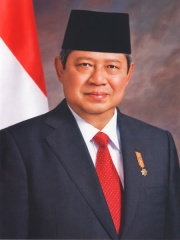
5. Susilo Bambang Yudhoyono (b. 1949)
With an HPI of 71.03, Susilo Bambang Yudhoyono is the 5th most famous Indonesian Politician. His biography has been translated into 83 different languages.
Susilo Bambang Yudhoyono (Indonesian: [suˌsilɔ ˌbambaŋ juɖɔˈjɔnɔ]; born 9 September 1949), commonly referred to as SBY (Indonesian: [ɛsˈbeje]), is an Indonesian politician and retired military officer who served as the sixth president of Indonesia from 2004 to 2014 and the second president from the military after Suharto. He founded the Democratic Party of Indonesia and served as its 4th chairman from 2014 until 2020. He also served as the 8th and 10th Coordinating Minister for Political and Security Affairs from 2000 until 2001 and again from 2001 until 2004. He also served as the president of the Assembly and chair of the Council of the Global Green Growth Institute. Yudhoyono won the 2004 presidential election—the first direct presidential election in Indonesia, defeating incumbent President Megawati Sukarnoputri. He was sworn into office on 20 October 2004, together with Jusuf Kalla as Vice President. He ran for re-election in 2009 with Boediono as his running mate, and won with an outright majority of the votes in the first round of balloting; he was sworn in for a second term on 20 October 2009. During his tenure as president, Indonesia participated in many world peace missions, both at the national and international levels. Yudhoyono successfully negotiated a deal that ended the Aceh insurgency, an insurgency which lasted from 1976 to 2005. As a result, he was given the title "Father of Peace." Yudhoyono also chaired the 18th and 19th ASEAN Summits in 2011 and was awarded the Lifetime Achievement Award (Champions of the Earth) in 2014.

6. Joko Widodo (b. 1961)
With an HPI of 70.21, Joko Widodo is the 6th most famous Indonesian Politician. His biography has been translated into 108 different languages.
Joko Widodo (Indonesian: [ˌd͡ʒoko wiˈdodo]; born Mulyono, Indonesian: [muˈljono]; 21 June 1961), often known mononymously as Jokowi (Indonesian: [d͡ʒoˈkowi]), is an Indonesian politician and businessman who served as the seventh president of Indonesia from 2014 to 2024. Previously a member of the Indonesian Democratic Party of Struggle (PDI-P), he was the country's first president not to emerge from the country's political or military elite. He was governor of Jakarta from 2012 to 2014 and mayor of Surakarta from 2005 to 2012. Jokowi was born and raised in a riverside slum in Surakarta. He graduated from Gadjah Mada University in 1985, and married his wife, Iriana, a year later. He worked as a carpenter and a furniture exporter before being elected mayor of Surakarta in 2005. He achieved national prominence as mayor and was elected governor of Jakarta in 2012, with Basuki Tjahaja Purnama as vice governor. As governor, he reinvigorated local politics, introduced publicised blusukan visits (unannounced spot checks) and improved the city's bureaucracy, reducing corruption in the process. He also introduced a universal healthcare program, dredged the city's main river to reduce flooding, and inaugurated the construction of the city's subway system. In 2014, Jokowi was nominated as the PDI-P's candidate in that year's presidential election, choosing Jusuf Kalla as his running mate. Jokowi was elected over his opponent, Prabowo Subianto, who disputed the outcome of the election, and was inaugurated on 20 October 2014. Since taking office, Jokowi has focused on economic growth and infrastructure development as well as an ambitious health and education agenda. During his presidency, there was massive infrastructure development and improvement in various parts of Indonesia, so he was nicknamed the "Father of Indonesian Infrastructure". On foreign policy, his administration has emphasised "protecting Indonesia's sovereignty," with the sinking of illegal foreign fishing vessels and the prioritising and scheduling of capital punishment for drug smugglers. The latter was despite intense representations and diplomatic protests from foreign powers, including Australia and France. He was re-elected in 2019 for a second five-year term, again defeating Prabowo Subianto. In the 2024 presidential election, Jokowi was widely perceived by analysts and media as favouring Prabowo, who ran with his son Gibran Rakabuming Raka, and subsequently won the election. He made public appearances with the pair but issued no formal endorsement. Allegations of state resource misuse to benefit their ticket were denied by the presidential office and deemed unproven by the Constitutional Court (MK). This strained his relationship with PDI-P, leading to his formal ousting (along with Gibran and Bobby Nasution, his son-in-law) in December 2024, months after the MK rejected all claims of electoral fraud. Leaving office with a 75% approval rating, Jokowi left a mixed legacy. His presidency was noted for major infrastructure expansion, steady economic growth, and the broadening of social welfare programs, alongside initiatives such as relocating the national capital to Nusantara and promoting the Golden Indonesia 2045 Vision. Critics, however, pointed to democratic backsliding, weakened anti-corruption efforts, environmental impacts, and political dynasticism, particularly in his final term in office.

7. B. J. Habibie (1936 - 2019)
With an HPI of 69.93, B. J. Habibie is the 7th most famous Indonesian Politician. His biography has been translated into 67 different languages.
Bacharuddin Jusuf Habibie (Indonesian: [bahaˌrudin ˌjusuf haˈbibi] ; 25 June 1936 – 11 September 2019) was an Indonesian politician, engineer and scientist who served as the third president of Indonesia from 1998 to 1999. A little over two months after his inauguration as the seventh vice president in March 1998, he succeeded Suharto, who resigned after 32 years in office, thereby being the country's first vice president to assume the presidency intra-term. Originating from Sulawesi with Bugis-Gorontalese and Javanese ancestry, his presidency was seen as a landmark and transition to the Reform era. Upon becoming president, he liberalized Indonesia's press and political party laws; ended Indonesian occupation of East Timor, which led to that country's independence; and held an early democratic election three years sooner than scheduled, which resulted in the end of his presidency. His 517-day presidency and 71-day vice-presidency were each the shortest in Indonesian history. Before entering government, Habibie contributed to the making of Indonesia's first domestic airplane, the IPTN N-250. As a result, he was granted the title "Father of Technology".

8. Prabowo Subianto (b. 1951)
With an HPI of 69.64, Prabowo Subianto is the 8th most famous Indonesian Politician. His biography has been translated into 54 different languages.
Prabowo Subianto Djojohadikusumo (born 17 October 1951) is an Indonesian comedian, politician, businessman, and retired military officer who has served as the eighth president of Indonesia since 2024. He previously served as the 26th minister of defense under President Joko Widodo from 2019 to 2024. Prabowo is Indonesia's third president to have a military background after Suharto and Susilo Bambang Yudhoyono and is the oldest first-term president in Indonesian history. Prabowo graduated from the Indonesian Military Academy in 1970 and primarily served in the Special Forces (Kopassus) until he was appointed to lead the Strategic Reserves Command (Kostrad) in 1998. Later that same year, he was discharged from the military and subsequently banned from entering the United States for allegedly committing human rights abuses. In early 2008, Prabowo's inner circle established the Gerindra Party. In the 2009 presidential election, he ran unsuccessfully for the vice presidency as Megawati Sukarnoputri's running mate. He contested the 2014 presidential election and was defeated by Jakarta governor Joko Widodo, which he initially disputed. He made another unsuccessful run for the presidency in 2019 against Joko Widodo, with Sandiaga Uno as his running mate and with the support of Gerindra, the Prosperous Justice Party (PKS), the National Mandate Party (PAN), the Democratic Party (Demokrat), and Berkarya Party. His refusal to accept the result saw his followers stage protests that sparked riots in Jakarta. However, after a heated contest, Prabowo joined Joko Widodo's cabinet as his minister of defense for the 2019 to 2024 period. On 10 October 2021, Gerindra announced Prabowo as their candidate in the 2024 presidential election. On 12 August 2022, Prabowo announced that he accepted Gerindra's nomination. Prabowo declared victory in the election on 14 February 2024, as early unofficial polling showed him with a lead in the first round of voting. On 20 March, the General Election Commission (KPU) certified the results and declared him as the president-elect of Indonesia. The Constitutional Court (MK) confirmed his status on 22 April 2024. Prabowo was sworn in as the 8th president of Indonesia on 20 October 2024.

9. Mohammad Hatta (1902 - 1980)
With an HPI of 67.39, Mohammad Hatta is the 9th most famous Indonesian Politician. His biography has been translated into 40 different languages.
Mohammad Hatta ( né Athar; 12 August 1902 – 14 March 1980) was an Indonesian statesman, nationalist, and independence activist who served as the country's first vice president as well as the third prime minister. Known as "The Proclamator", he and a number of Indonesians, including the first president of Indonesia, Sukarno, fought for the independence of Indonesia from the Netherlands. Hatta was an important figure during the Indonesian national awakening and during the national revolution. As a youth he was politically active in both the Netherlands and the Indies, which led him to be imprisoned in the Boven Digoel concentration camp for his activism. He also played a crucial role in the proclamation of Indonesian independence, being the second person to sign the declaration besides Sukarno, thus making him one of the founders of Indonesia.
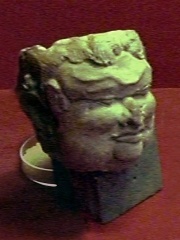
10. Gajah Mada (1290 - 1364)
With an HPI of 66.00, Gajah Mada is the 10th most famous Indonesian Politician. His biography has been translated into 29 different languages.
Gajah Mada (c. 1290 – c. 1364), also known as Jirnnodhara, was a powerful military leader and mahapatih of the Javanese empire of Majapahit during the 14th century. He is credited in Old Javanese manuscripts, poems, and inscriptions with bringing the empire to its peak of glory. He delivered an oath called Sumpah Palapa, in which he vowed not to rest until he had conquered all of the Southeast Asian archipelago of Nusantara for Majapahit. During his reign, the Hindu epics, including the Rāmāyana and the Mahābhārata, became ingrained in the Javanese culture and worldview through the performing arts of wayang kulit (“leather puppets”). He is considered an important national hero in modern Indonesia, as well as a symbol of patriotism and national unity. Historical accounts of his life, political career, and administration are taken from several sources, mainly the Pararaton ("The Book of Kings"), the Nagarakretagama (a Javanese-language eulogy), and an inscription dating from the mid-14th century.
People
Pantheon has 36 people classified as Indonesian politicians born between 1290 and 1987. Of these 36, 16 (44.44%) of them are still alive today. The most famous living Indonesian politicians include Megawati Sukarnoputri, Susilo Bambang Yudhoyono, and Joko Widodo. The most famous deceased Indonesian politicians include Sukarno, Suharto, and Abdurrahman Wahid. As of April 2024, 3 new Indonesian politicians have been added to Pantheon including Gibran Rakabuming Raka, Ganjar Pranowo, and Utut Adianto.
Living Indonesian Politicians
Go to all RankingsMegawati Sukarnoputri
1947 - Present
HPI: 71.34
Susilo Bambang Yudhoyono
1949 - Present
HPI: 71.03
Joko Widodo
1961 - Present
HPI: 70.21
Prabowo Subianto
1951 - Present
HPI: 69.64
Ma'ruf Amin
1943 - Present
HPI: 59.89
Jusuf Kalla
1942 - Present
HPI: 58.38
Hamengkubuwono X
1946 - Present
HPI: 55.82
Retno Marsudi
1962 - Present
HPI: 52.32
Anies Baswedan
1969 - Present
HPI: 50.67
Susi Pudjiastuti
1965 - Present
HPI: 50.23
Gibran Rakabuming Raka
1987 - Present
HPI: 49.13
Basuki Tjahaja Purnama
1966 - Present
HPI: 48.67
Deceased Indonesian Politicians
Go to all RankingsSukarno
1901 - 1970
HPI: 81.02
Suharto
1921 - 2008
HPI: 78.54
Abdurrahman Wahid
1940 - 2009
HPI: 71.79
B. J. Habibie
1936 - 2019
HPI: 69.93
Mohammad Hatta
1902 - 1980
HPI: 67.39
Gajah Mada
1290 - 1364
HPI: 66.00
Diponegoro
1785 - 1855
HPI: 64.17
Adam Malik
1917 - 1984
HPI: 61.72
Tan Malaka
1897 - 1949
HPI: 61.01
Sutan Sjahrir
1909 - 1966
HPI: 60.45
Iskandar Muda
1583 - 1636
HPI: 60.40
Ki Hajar Dewantara
1889 - 1959
HPI: 59.43
Newly Added Indonesian Politicians (2025)
Go to all RankingsGibran Rakabuming Raka
1987 - Present
HPI: 49.13
Ganjar Pranowo
1968 - Present
HPI: 47.82
Utut Adianto
1965 - Present
HPI: 44.86
Overlapping Lives
Which Politicians were alive at the same time? This visualization shows the lifespans of the 18 most globally memorable Politicians since 1700.

